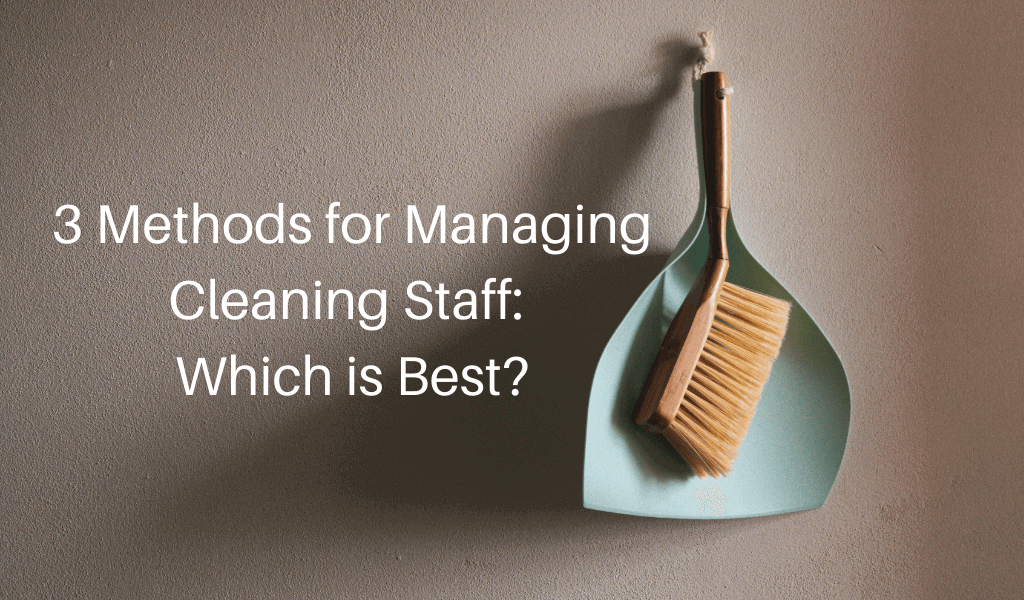When it comes to managing cleaning staff, you have options. But they aren’t all good choices.
It’s no secret that the cleaning industry has notoriously high staff turnover. Part of that is just the nature of the business, with late hours and sometimes challenging work environments. You can’t always do much to change that, but the way you’re managing cleaning staff can have a huge impact, positive or negative, on that turnover rate.
There are several approaches to management. Some methods have been around for ages, while other approaches are new and may be unfamiliar. Is one better than the other? How many methods are there for managing cleaning staff?
Let’s take a look at a few of them, as well as some of the pros and cons of each.
Work smarter, not harder, with Janitorial Manager. Get your free discovery call today to find out how you can make yourself better!
Managing cleaning staff: 3 approaches that work (or don’t)
There are various thoughts on managing cleaning staff. In many cases, the methods that don’t work well are still in practice because we haven’t been introduced to other ideas. Or there’s a concern that employees will try to take advantage of a manager who doesn’t hold up certain standards. Let’s break some of these down.
1. The tough approach. At first glance, this is an understandable approach to managing cleaning staff. The responsibility of getting the job done right is on your shoulders. If people slack off or don’t do a good job, there are potential consequences, such as dealing with an angry client or losing a contract.
What does this look like in practice? There’s a good chance you started your career with a manager that took this tact. There may be unpaid suspensions, expecting employees to work sick, yelling at people for mistakes, and other punitive measures.
Again, the concern here is that without these strict conditions, employees will do a poor job, they’ll take time off whenever they feel like it, or they’ll continue to ignore management directives. But fear rarely works as a motivator. It may get the results you want in the short term, but it’s a sure way to sow the seeds of discontent, and it guarantees even your best employees will look for jobs elsewhere.
But there’s a much more sinister aspect to this approach. In 2020, the Washington State Department of Labor & Industries published the results of a study that found workers in the janitorial industry often face issues of unsafe working conditions, harassment and bullying from supervisors, and wage violations.
These issues aren’t just about poor management practices, either. They can set your company up for legal problems, resulting in anything from a bad reputation to fines to criminal charges.
While there may be times you need to be tough, or you may have employees who do, indeed, game the system, chances are that if you provide a safe and healthy work environment, your team will stay with you and offer top-notch work.
2. The uninformed approach. This style of management is more common than many people realize. These are the managers who have every intention of improving things, but don’t actually work in the field. In fact, they’ve never worked in the field.
What does this look like? It’s often a top-heavy approach that fails to consider the realities of working in the janitorial industry. Things constantly change. One day they want you to sweep everything with a microfiber cloth, and the next, you’re only supposed to use a cotton mop. They get snazzy company vehicles while you’re struggling with a mop bucket that’s missing a wheel.
This is a classic case of usually well-intentioned but poorly informed management. While these managers generally mean well, they simply don’t have the experience to be effective.
3. The new-style approach. This is a modern approach to managing cleaning staff. This manager does or has worked as a janitor or facilities person. They’ve learned what to do – and what not to do. They are responsive to their team and understand that this is just a job for many people and not life. It’s a means to an end. This is the manager who believes that if they take care of their team, their team will take care of their customers.
What does this look like? This person is still the manager. They will still need to deal with issues like employees cutting corners or not showing up for shifts. But it’s not a threat or something they remind people of. This is the manager who will pitch in if the team is short-staffed. They’ll try to accommodate schedule requests and make sure no one is overworked.
This is the manager people want to work for. They’ll go out of their way to make sure the job gets done right.
Why it matters
Why does the style of managing cleaning staff matter? Among other reasons, let’s take a look at turnover. We all know how stressful it is when people leave. There’s an entire process of finding, hiring, and training new people, interruptions to service, and the additional pressure it puts on your other team members.
Good management is the key to keeping your team steady. It’s also good for business. Your customers don’t want to see a continually changing cast come into their business. It gives the impression that there’s something wrong with your business.
It’s true that managing cleaning staff is not always a walk in the park. Managing people in any industry can be a challenge at times. But the more we work toward treating people well and creating a positive work environment, the easier the job gets.
Increase the efficiency of your team, reduce your costs, and improve results. With Janitorial Manager, all this and more isn’t just a dream, it’s your new reality. Contact us for a free demo right now and see how it works!


